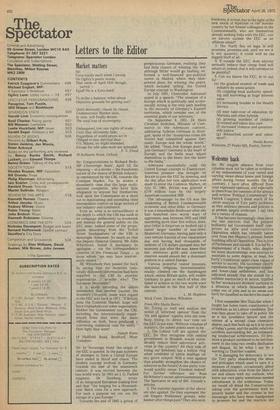Market matters
Sir: Voraciously each week I swoop On Ogilvy's poetic scoop, That verse of April 12th though, jarred — Egad! He is a Euro-bard!
To strike a balance, what about Objective grounds for getting out?
Quite deviously, clause by clause, Undemocratic Market laws, In time, will finally decree The total loss of sovereignty.
Endangered, too, our rights of trade Until they ultimately fade; Regardless of world prices we're Obliged to buy survival dear. P.S. Milord, no slight intended, Except for odd odes most are splendid!
F. S. Flood
19 Kelbume Road, Oxford Sir: Congratulations to Richard Body, MP ('Sovereign State', April 12) for exposing — at a stroke — the fraudulent nature of the stance of British industry, as represented by the CBI, towards the Common Market. For he makes it abundantly clear that the large multinational companies, who have little allegiance to anyone but themselves, look upon the Commission as a short cut to maintaining and extending their monopolistic control on large sectors of our industry and commerce.
Even so, what is so extraordinary is the depth to which the CBI has sunk in its campaign deliberately to hoodwink and mislead the general public on the EEC issue. Indeed some of the propaganda emanating from the Tothill Street headquarters of the CBI is downright dishonest. So much so that the Deputy Director General, Mr John Whitehorn, found it necessary to apologise — via the correspondence columns of the Financial Times — to those whom "we may have inadvertently misled."
Mr VVhitehorn then passed the buck by saying that the incorrect (nay, totally dishonest) information had been supplied to the CBI by another organisation. I wonder who? The European Movement?
It is worth recording the astute assessment that another journal, the Investors Chronicle, made with regard to the EEC way back in 1971: "If Britain joins the Common Market, hope will have triumphed over sober expectation. Neither the Government nor the CBI, including the internationally experienced firms that were the main influence on both, have produced a convincing statistical case for entry." How right they were!
Joseph Kane 14 Hallfield Road, Bradford, West Yorkshire Sir: In 'Sovereign State' the origin of the EEC is queried. In the past numbers of attempts to form a United Europe have ended in blood and chaos. The modern concept evolved in Germany towards the end of the nineteenth century. It was revived between the two world wars. In 1931 an I. G. Farben magnate, Dr Duisberg, wrote of an integrated European trading-bloc and that "the longing for a thousandyear Reich cries for a new approach. For such a purpose we can use the mirage of a pan-Europe."
Towards the end of 1943 a group of perspicacious Germans, realising they had little chance of winning the war although Hitler would go bashing on, formed a well-financed geo-political centre in Madrid, where they blueprinted plans for winning the peace, which included 'selling' the United Europe concept to Washington.
In July 1951, Chancellor Adenauer stated in a speech: "The creation of a Europe which is politically and economically strong is the only path leading to the recovery of Germany's Eastern territories, which remains one of the essential goals of our activities."
On September 9, 1951, Dr Hans Christian Seebohm, Minister of Commerce in the Adenauer cabinet, addressing Sudeten Germans in Stuttgart, spoke of the "monstrous crime the victors had committed against Germany, Europe and the whole world." He added: "Does free Europe want to join Germany? Germany is the heart of Europe, and the limbs must adjust themselves to the heart, not the heart to the limbs."
Adenauer successfully 'sold' the United Europe concept to Eisenhower. Immense pressure was brought on Britain to join the EEC by America, and the day after her first application was made to enter the Common Market, on July 31, 1961, Britain was granted a E716 million loan by the largely American-controlled IMF.
The 'advantage' to the US was the weakening of British Commonwealth economic and other links: to Germany it was a remarkable deodorant after she had launched two world wars of aggression, and, between 1933 and 1945 murdering more than five million Jews, plus (what is forgotten or hushed up) a rather larger number of non-Jews. Moreover, Germany, having paid only a very minute fraction of war reparations due and having had thousands of millions of US dollars pumped into her economy just after the wan knew that her immense gold and currency reserves would ensure her a dominant position in a united Europe.
Various powerful vested interests, industrial, religious, internationalist, readily climbed on the bandwagon which, unless Britain quits, will enable Germany to gain so much of what she failed to achieve in the two world wars she launched in the first half of this century.
L. M. Hopkins Wick Crest, Devizes, Wiltshire From Mrs Sheila Burns










































 Previous page
Previous page